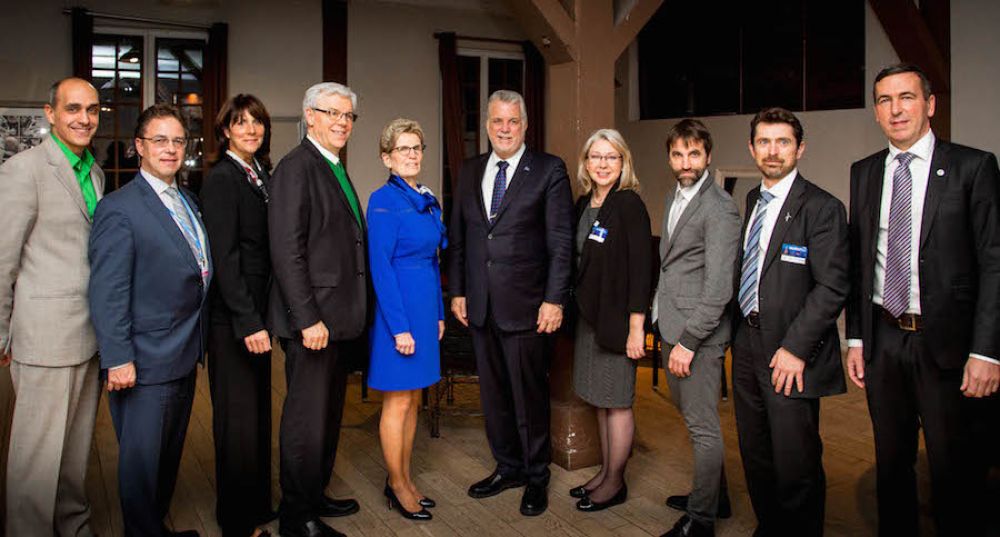The Pembina Institute is proud to be in Paris for the duration of the United Nations climate change negotiations, known as COP21. During week one, Erin Flanagan and Amin Asadollahi were on the ground acting as official observers at the Paris climate talks. Ed Whittingham and Josha MacNab arrived over the weekend to join their efforts until the end of the conference on December 11. We'll be posting their thoughts and experiences in Paris here.
Still hope for a strong Paris climate agreement
Dec. 11, 2015 - By Erin Flanagan and Josha MacNab
It’s Friday night in Paris, and there is still no climate agreement. Negotiations are expected to run through the night. We’re watching closely to see what the final agreement holds tomorrow. In particular, we’ll be watching for:
- A high level of ambition in the long-term goal: Currently 1.5 C is on the table, and we are looking for confirmation from the international community that they are willing to take on an ambitious long-term goal.
- A commitment to “ratchet up” the individual commitments for each country: Assessing progress regularly is a good start, but we need to see a commitment to increase the level of ambition of each country’s commitment at regular intervals as well, or we won’t be able to meet our goals.
We’re expecting the final agreement sometime Saturday afternoon (Paris time). Stay tuned for our final analysis of what it contains and what it means for Canada and our provinces and territories.
Celebrating provincial climate action in Paris
Dec. 9, 2015 - By Ed Whittingham
The climate negotiations in Paris are a time for action and to look ahead – but last night we also took some time to celebrate action already taken.
Last night, the Pembina Institute co-hosted “Canada Night” with Équiterre and Environmental Defence, an event recognizing Canadian climate action. It was an exciting night, with over 300 attendees representing Canadians from coast to coast to coast.
Quebec Premier Phillippe Couillard, Ontario Premier Kathleen Wynne and Manitoba Premier Greg Selinger spoke about their province’s cap-and-trade approach to pricing carbon. Manitoba’s recent announcement to join the Western Climate Initiative was some of the most talked about news of the night.

Alberta’s environment minister, Shannon Phillips, talked about the province’s recently announced climate plan, a robust, comprehensive plan that’s a game changer for the climate laggard-turned-leader. B.C.’s environment minister Mary Polak spoke of her government’s Climate Leadership Plan review, including the prospects of unfreezing its carbon tax in 2018.
It’s a great time to be a Canadian climate advocate — there’s an overwhelming feeling here in Paris that Canada is back, and we’re looking forward to continuing to work with the federal and provincial governments to keep up the momentum after these talks.
Take a look below at my recap of the night, on a wet but still bustling Le Marais street.
What are some of the key issues being debated in Paris?
Dec. 7, 2015 - By Amin Asadollahi
The key crosscutting issues that remain unresolved at the Paris climate negotiation are differentiation, progression, ambition, and support. Let’s work through these one by one to get a better sense of these key issues that remain in play.
Differentiation
There has been a great deal of discussion over a common goal to tackling climate change but with different levels of responsibility among nations. At the core of these discussions is the notion of equity and capability.
The majority of post-industrial emissions caused by humans can be attributed to activities pursued by developed countries. In other words, developed nations are largely responsible for the changes in climate that we are experiencing now. However, the majority of the world’s growth in emissions is expected to come from developing nations. Collectively, all global actors must work to bend the global emissions curve with developed nations demonstrating leadership to ensure global equity.
Canada was in a particularly difficult position to ask others to reduce while its emissions continued to grow. Past projections attributed to oilsands expansion was the principle cause of the country’s emissions growth. Alberta’s recently announced climate plan is designed to address oilsands emissions and increase the province’s renewable energy profile. Combined with announcements from other provinces, Canada is in a stronger position to ask others to reduce their emissions.
Progression
Global emissions are on an upward trajectory despite past climate commitments. A comprehensive Paris climate plan must include a review process to take stock of each country’s progression against their commitments. The draft agreement includes language around this and suggests the review inform the level of additional effort needed. There is a broad level of support — including from Canada — for a five-year review period. It would provide multiple opportunities to assess progress and take corrective measures. Without a review mechanism, the global community could lock the world into an emissions trajectory that would put us even closer to dangerous levels of climate change.
Ambition
Current levels of global ambition will not result in a climate safe future for generations to come. Some of the options under consideration to address this reality include: the notion of an emissions peak with rapid reductions thereafter until 2050; zero global emissions in the second half of the century; low emission transformation, climate neutrality, decarbonization soon after 2050; and/or distribution of a carbon budget across countries.
These options would require a rapid transformation of the global economy. Such ambition will kick start policies that can see economic growth with investment and job creation in clean energy while Canada’s emissions move toward levels informed by climate science.
The Paris agreement would ask the Intergovernmental Panel on Climate Change (IPCC) to assess the impact of 1.5°C temperature change and provide advice on pathways needed to stay within such limit. The IPCC’s last report only referenced the impacts of climate change at large and not a particular temperature. World leaders and citizens need this information to make better decisions — both in terms of mitigation and adaptation. In addition, a study of 1.5°C is likely to depict the risks of such temperature growth and the need to increase the level ambition in the next round of climate change negotiations. Over 100 countries at the Paris negotiations have shown support for a 1.5°C target, with Canada joining those ranks.
The support of Canada for a 1.5°C science-based target demonstrates our commitment to increasing the global level of ambition needed to achieve safer climate limits.
Support
All nations do not have the same capability to reduce emissions. Similarly, not every nation has equal capability to adapt to the impacts of climate change. Least developed countries remain especially vulnerable to climate change with limited ability to act and/or adapt. They are exposed to significant climate risks such as land impacts due to rising water levels, food production impacts due to droughts and extreme weather patterns.
That said, the opportunities in developing nations are tremendous. Per tonne emission reductions costs are typically much less than that of the developed world. This fact does not release developed nations of responsibility to meet their climate commitments. On the contrary, all countries should meet their emission reduction commitments through domestic measures and should work to secure additional reductions opportunities available in developing nations.
A critical element throughout the negotiations has been “climate finance” — financial support for mitigation and adaptation activities. A fault line between developed and developing states has been the extent to which climate finance commitments are secured in Paris to support deep reduction opportunities around the globe.
In a recent announcement, the Canadian government committed $2.65 billion in total investment — $800 million a year — by 2020 for international climate finance “to support the efforts and actions of the poorest and most vulnerable countries to adapt to the adverse effects of climate change.” This is an exciting development, however, more work is required. G20 countries — including Canada — committed to $100 billion of funding per year by 2020 and Canada’s fair share is about $4 billion a year. Environmental organizations in Paris are keen to hear details on how the gap between Canada’s recent announcement and its fair share will be met.
Our Minister of Environment and Climate Change, Catherine McKenna, has been invited to facilitate the final stages of negotiations. If Canada is truly back, our minister will continue to work to bring home an ambitious Paris agreement that is based on science and core principles of fairness and equity. The clock is ticking for a new global consensus.
We’ll continue to watch closely.
A brief history of climate negotiations
Dec. 7, 2015 - By Amin Asadollahi
The first time the world decided to act on climate — the Kyoto Protocol — we agreed on self-prescribed 2020 emission targets that were only binding for developed nations. At Copenhagen we agreed that we should keep average temperature increases below 2 degrees and described that as a climate safe limit.
The negotiation here in Paris is intended to cover emissions across all countries as well as non-country sourced emissions such as aviation and marine transport. These can be as high as developed country emissions and have thus far gone unchecked.
The world is here in Paris to increase the ambition level needed to bring emissions within climate safe limits. But the stakes are high. By delaying what’s needed to decarbonize our economies the cost of addressing climate action will grow rapidly.
In this light, we are witnessing increasing number of private sector entities realizing that the cost of carbon pollution will continue to increase if it is not priced.
For its part, the Government of Canada has announced its intention to price carbon pollution. Here in Paris, it also joined the Carbon Pricing Leadership Coalition.
The Paris climate negotiation is not likely to result in an agreement on carbon pricing. Right now it is only referenced once in the text as an important instrument. However, that reference alone — in conjunction with a broad call for the world to put a price on carbon pollution — will most likely result in post-Paris and outside of the agreement momentum on subject.
The global imperative to act
Dec. 4, 2015 - By Amin Asadollahi
The climate change diagnosis is clear: the growing accumulation of greenhouse gases — in the atmosphere and its absorption in our oceans — is suffocating our planet.
Global temperatures are on the rise. According to the World Meteorological Organization, 2015 was marked as the hottest on record. The trajectory points up and the level of carbon dioxide (CO2) concentrations — a greenhouse gas — is on the rise. Most recently, CO2 concentrations in the atmosphere reached a dangerous milestone of 400 parts per million. According to ice-core records, this level has not been reached in the last 800,000 years — before humans existed.
When you add up all the international climate commitments submitted in advance of the Paris negotiations, the world is still on track to see our average temperature rise 2.7 to 3.7 degrees. According to Environment and Climate Change Canada, “Canada’s rate of warming is about twice the global rate” and “a 2ºC increase globally means a 3 to 4ºC increase for Canada.” Rising temperatures will impact our industries across the board as well as Indigenous communities — especially in the north where temperatures are expected to be even higher.
Growing scientific research has confirmed an increase of even 1.5 degrees puts the world in unsafe territory.
So, the message on the ground here is clear. The outcome of the Paris climate change negotiations will be vital to the health of the planet. To put us on the path to recovery, we must rapidly reduce our emissions and decarbonize our economy.









